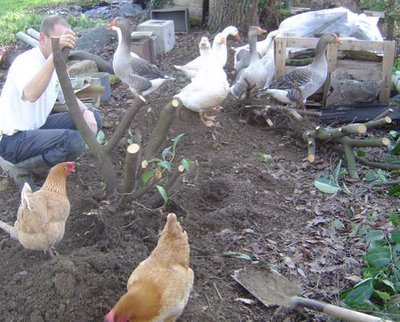
“There never was such a goose. Bob [Cratchit] said he didn't believe there ever was such a goose cooked. Its tenderness and flavour, size and cheapness were the themes of universal admiration.” Charles Dickens, A Christmas Carol.
Way back in July, (see blog for11th) when we bought the geese, we always knew that we were raising them for meat and they were not pets, nevertheless, we’ve thoroughly enjoyed their company over the last few months and I must confess to a little trepidation as the moment approached. We considered the possibility of taking the geese up the road to a chicken farm to be humanely despatched and mechanically plucked but decided against it. We’ve found them to be creatures of habit and every departure from their routine unsettled them. As an example, we used to give them some wheat grain in their drinking water bath each evening and had been giving them some maize as well. Noticing their habit for gnawing at things during the day, I put in a couple of complete cobs, which then floated. There was so much pandemonium when they walked in to their house and saw them, you’d have thought I’d put in a hand grenade, not a food treat. We decided, therefore, that dealing with the culling ourselves at home would be far less distressing for them than transporting them to the farm.
A week before Christmas, some friends—Caroline and a young French couple, Julie and Samuel—joined us to help kill and pluck our remaining nine geese. The killing was quick and efficient but not something that I much like doing. After that though, the day was enjoyable, working together with friends, outside on a crisp winter’s day, finishing around 4pm for a very late lunch. We’re proud to have made such a success of this particular venture and to take direct responsibility for some of the meat we eat. We ate one on Christmas Day and it was delicious.
Permaculture principles include trying to get multiple outputs from every plant, animal, structure or other element of a designed system. In addition to grass cutting and manuring the field, so improving the quality of the pasture, and providing meat (and eggs—next year, we’ll keep a breeding pair or two over-winter) we can also list as outputs “happy” geese—content in being well looked after—and “very happy” owners as they’ve provided much entertainment over their time here.
So fascinated have we been by their behaviour, we’ve bought a couple of books to read more about the animals we keep: The Year of the Greylag Goose by Konrad Lorenz, the famous Austrian ethologist (animal behaviouralist) who spent much of his life studying geese; and The Pig Who Sang to the Moon by Jeffrey Masson, a book on the emotional lives of farm animals by the guy who wrote When Elephants Weep, which I have read and found to be excellent.
